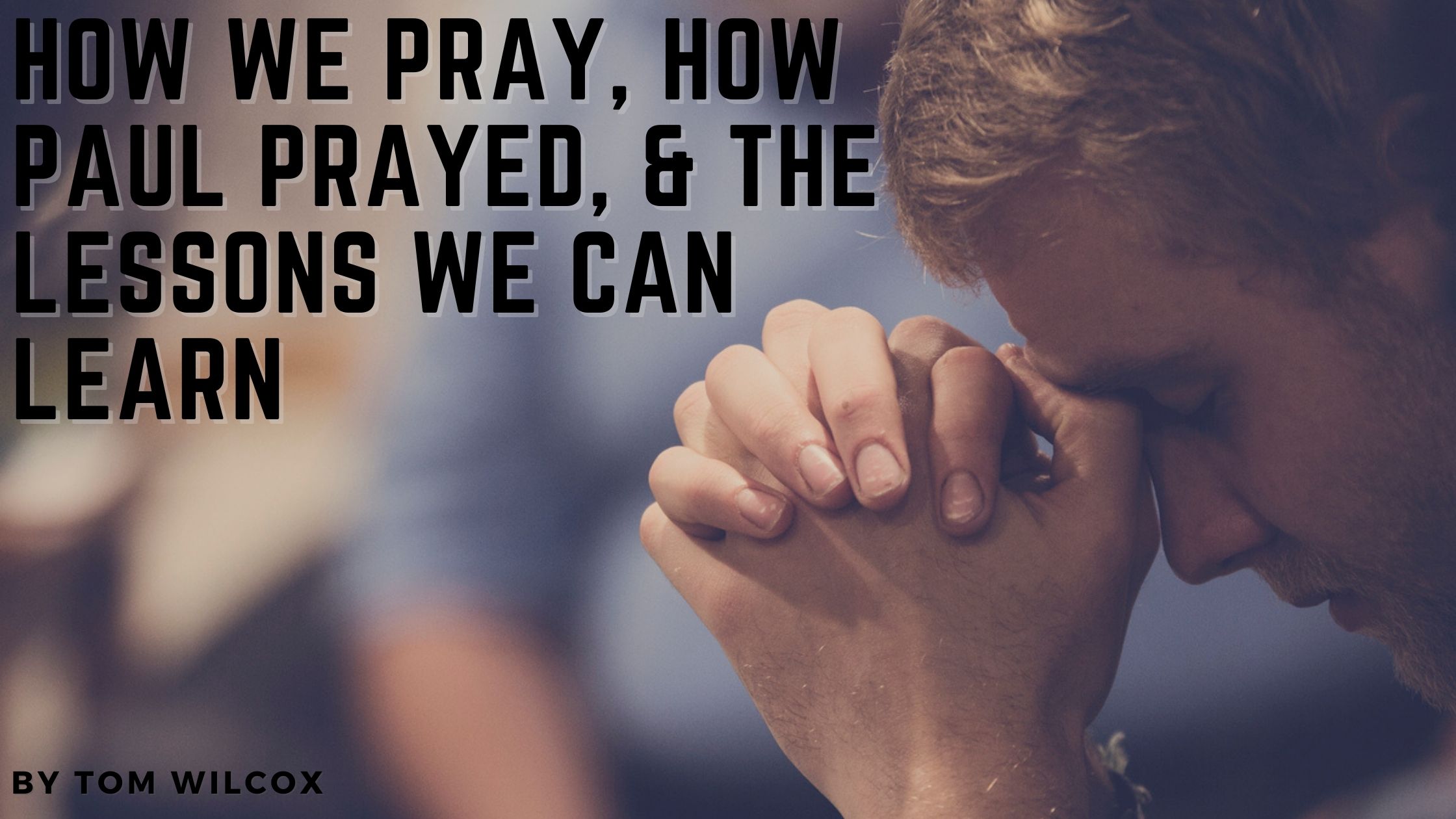Ephesians 3:16-21
I pray that out of his glorious riches he may strengthen you with power through his Spirit in your inner being, so that Christ may dwell in your hearts through faith. And I pray that you, being rooted and established in love, may have power, together with all the Lord’s holy people, to grasp how wide and long and high and deep is the love of Christ, and to know this love that surpasses knowledge—that you may be filled to the measure of all the fullness of God. Now to him who is able to do immeasurably more than all we ask or imagine, according to his power that is at work within us, to him be glory in the church and in Christ Jesus throughout all generations, for ever and ever! Amen.
–
How We Pray
Many times when we pray we can be either surface level or selfish.
Surface level prayers are usually quite shallow and focusing only on the external here and now. This happens when we pray things like Jesus please heal my aunt or Jesus please help me or my brother pass that exam.
And while we should pray about those things because Jesus is our healer and His Holy Spirit is our guide and God indeed dose care about every aspect of our lives, our prayers shouldn’t stop there.
Neither should they be self-centered. In her article on Medium, Carolyn Gatema shares a lot of wisdom about what makes a prayer selfish:
A selfish prayer is one that exalts personal desires over the will of God. When you pray selfishly, you want to fit God into the box of your need. You want Him to answer you in a certain way so that you can be happy.
Picture the way a child asks for candy from the parent. The child wants the candy now! The child asks for a specific type, color and flavor without considering what the parent-the provider-wants. This child does not care for allergies, money and other medical complications that may arise from the candies.
That is what many of us Christians do in prayer. We do not care that if God gives us the answer we want someone will get hurt, we will appear vindictive or we will get hurt. We want a certain answer and we want it now!
In hearing this, we need to learn the value of praying deep prayers like the Apostle Paul’s and Peter’s prayers that go beyond the self and the surface.
How Paul Prayed
When Paul prayed he often skipped the surface level stuff like finances, health or Peter’s mom and instead focused on the core of what it means to be a follower of Jesus Christ.
His prayers often include things like “that you may be rooted and established in love” and “that you will come to know how great how wide and how deep the love of Jesus is”.
When we pray things like this we get at the core of who we are by being reminded of who God is. When we go from a me or even an us-centric prayer life to a God-centered prayer life, we will begin to reorient ourselves in light of the characteristics of our heavenly Father, and even more incredible (in my opinion) we will begin to see him reorient our lives to better reflect Him!
Getting beyond just the surface of what’s going on allows God to fix the heart issues that are at the center of our lives. When this happens every area of our lives, our thoughts, our attitudes, and the way we process things both good and bad becomes transformed to be able to see things God’s way (Romans 12:2).
Prayer in community
We were never meant to walk this life in Christ alone, which is why we see both in the prayers of Jesus and of the apostles’ statements like this one in Paul’s prayer for the church in Ephesus. “together with all the Lord’s holy people” (Matthew 6:9-13, Acts 1:14, Acts 2:42, Ephesians 6:18)
We need to remember that part of being rooted in love is being rooted in community with one another. When we are doing this we are following what Jesus modeled for us and we are able to build each other up.
On that note, In his book Rooted: The Hidden Places Where God Develops You, Banning Liebscher shares this insight to help us appreciate the value of community to our spiritual walk:
Never once did Jesus say, “It’s just you and Me. You don’t need anybody else in your life.” He’s the One you need for salvation, but when you connect with Jesus, He points you toward people and say, “Welcome to the family.”
Relationships like these create environments for love to thrive because they create environments of trust and compassion that open the door for conversations that build up as well as correct each other. Both of these help us as believers grow in the fullness of the body of Christ by refining our gifts and being constantly reminded of the Truth of God’s Love.
God’s Love Changes Things
God’s love is a powerful thing. It changes the way we see, experience, and interact with life. God Himself is love and when we live in love, He lives in us and us in Him (1 John 4:16). When we are filled with God’s love a screaming child can be loved regardless of their volume. That loss of Job that seemed like the end of the world can be an opportunity to experience something brand new, and that long time health issue (as even Paul was familiar with) can be an avenue of giving God glory because of our attitude and His sustaining power in that.
But most importantly, when I am filled with God’s love, I am able to love others deeply and genuinely regardless of if they are lovable or not. That’s the power of God’s love.
Matthew 5:43-47 gives us a clear picture as to how we should love on the basis of God’s love for us:
“You have heard that it was said, ‘Love your neighbor and hate your enemy.’ But I tell you, love your enemies and pray for those who persecute you, that you may be children of your Father in heaven. He causes his sun to rise on the evil and the good, and sends rain on the righteous and the unrighteous. If you love those who love you, what reward will you get? Are not even the tax collectors doing that? And if you greet only your own people, what are you doing more than others? Do not even pagans do that?
Indeed, we love because He loved us first (1 John 4:19). And He demonstrates it to us that while we were still sinners, Christ died for us (Romans 5:8). Isn’t that a beautiful thought?
Ending With Glory
When we pray we do well to remember that God is the reason for our prayers. Let’s never get so focused on us and our needs, as valid as they may be, that we lose sight of the one who cares for us.
The wonderful thing is that when we pray, we recognize our dependence on our Creator and his awe-inspiring bigness to handle absolutely any situation we may face. Nothing could ever be bigger than the God we serve – not even that terminal illness or that economic recession caused by the pandemic. Not only that but we get a window into His unfathomable love as our heavenly Father.
When it comes to God’s glory, John Piper explained it well in his article entitled Prayer: We Get the Help, He Gets the Glory:
When we ask him for help, we know that he will give it for his name’s sake, not because we deserve it. His helping us highlights his riches. “God will supply every need of yours according to his riches in glory in Christ Jesus” (Philippians 4:19). Jesus died to obtain all the help we need. So not just our praises, but also our petitions, become ways of glorifying God. They draw attention to his riches, not our rights.
God exalts his grace and power by giving help rather than demanding it. He designs the Christian life so that we get the joy as he gets the glory.
Piper gave us an amazing thought in his other Desiring God article on prayer:
And what makes this so amazing for prayer is that he virtually invites us to load him down with our burdens: “Do not be anxious about anything, but . . . let your requests be made known to God” (Philippians 4:6). “Cast all your anxieties on him . . . .” (1 Peter 5:7). This invitation takes on tremendous power when we see God’s glory is at stake.
Prayer is not just a way to communicate with God, but it’s also a way to give him glory.

